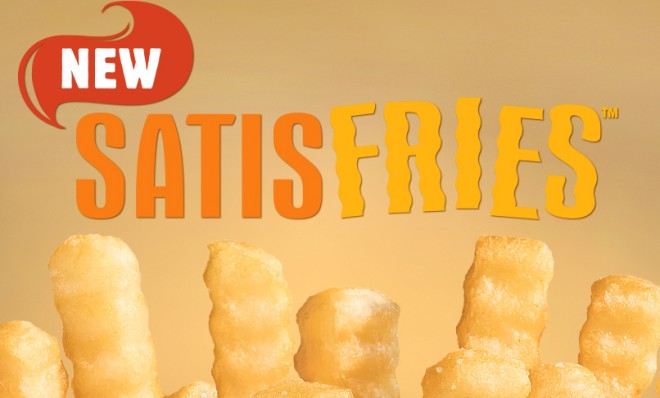Satisfries: Will Burger King's low-calorie french fries revolutionize fast food?
And more to the point, are the extensively researched crinkle-cut fries any good?


A free daily email with the biggest news stories of the day – and the best features from TheWeek.com
You are now subscribed
Your newsletter sign-up was successful
McDonald's is pretty much the undisputed king of the fast-food french fry. Even people who would never touch a Big Mac or ingest a Chicken McNugget will occasionally line up at the Golden Arches to get their fix of those golden fries. Burger King knows this, too. But it hasn't taken the beating lying down. On Tuesday, America's No. 2 burger franchise is rolling out its secret weapon: Satisfries.
It took 10 years of research and a little magic, but Burger King has developed a crinkle-cut french fry it claims has 30 percent less fat and 20 percent fewer calories than its traditional fries. The Satisfries stack up even better against McDonald's: 40 percent less fat and 30 percent fewer calories. The new fries use the same potatoes, the same oil, and even the same fryers as Burger King's other fries, but there's some ingredient in the batter that keeps the Satisfies from soaking up oil.
Burger King is expecting big things from its new, slightly more expensive french fry. "When it comes to what we eat, we know that small changes create a big impact," says Alex Macedo, president of Burger King North America. "This will grow, just like diet soda grew over time."
The Week
Escape your echo chamber. Get the facts behind the news, plus analysis from multiple perspectives.

Sign up for The Week's Free Newsletters
From our morning news briefing to a weekly Good News Newsletter, get the best of The Week delivered directly to your inbox.
From our morning news briefing to a weekly Good News Newsletter, get the best of The Week delivered directly to your inbox.
That's a bold claim. Diet soda is a huge money-maker, and it's based on a similar promise as the Satisfry: You can continue consuming the same food you love, only it will be somehow healthier. Better living through chemistry and food science. This "could be Burger King's biggest innovation in years," says Bruce Horovitz at USA Today. "Or it could be yet another BK french fry fiasco. Consumers will decide that at the cash register."
The early reviews are encouraging. "I wasn't really pleased with Burger King's last potato-related innovation, which involved sticking existing french fries into burgers," says Daniel Gross at The Daily Beast. "But this is a much better effort."
The fries taste good. They're crispy. They taste potato-ish, like good fast food fries should. They don't read in the mouth as "diet" or "low cal," the way that baked potato chips or sweet potato fries do. In a blind taste test, I don't think I — or your typical consumer — would have been able to distinguish this product from more fat-laden versions. And as I left, I had that same generalized feeling of satisfaction giving way to self-loathing you tend to get after eating junk food, only with slightly less guilt.... Maybe America isn't out of ideas just yet. [Daily Beast]
Alexandra Sifferlin at TIME concurs with Gross: "We tasted them, and you may not miss the 40 percent fat and 30 percent calories stripped from the spuds." But taste is just half of the equation. Health-wise, is there any real benefit in spending the extra 20 to 30 cents?
The Satisfries are "a better choice" than the regular fries, says Dr. Mike Roussell at Shape. "But if your dietary choices are hinging on which fry at your favorite fast food restaurant is the better option, there are other more pressing issues to be corrected in your diet."
A free daily email with the biggest news stories of the day – and the best features from TheWeek.com
Here's dirty secret of the weight-loss industry: Small changes don't make any sort of difference. It is a good idea, but it doesn't pan out in the real world.... If you eat fast food four times a week and want to change your body, that's great. It is great that you want to change. So maybe for a week or so you pick the lower-calories fries and a lower-calorie option on the menu. After a week or so (or even a couple weeks) of making the lower-calorie decisions, then you can start picking a different place to eat where the food isn't deep-fried. [Shape]
Burger King isn't really aiming to satisfy dietitians or public health officials, says Douglas MacIntyre at 24/7 Wall Street:
The company could simply believe that some portion of American consumers actually worry about their cholesterol and arteries. If Satisfries sales begin to rise quickly, Burger King will be ahead of the balance of the industry in terms of creating a lower-fat product with significant appeal. [24/7 Wall Street]
Take that, Mickey D's.
Peter has worked as a news and culture writer and editor at The Week since the site's launch in 2008. He covers politics, world affairs, religion and cultural currents. His journalism career began as a copy editor at a financial newswire and has included editorial positions at The New York Times Magazine, Facts on File, and Oregon State University.
-
 The Week Unwrapped: Have televised confessions quelled protests in Iran?
The Week Unwrapped: Have televised confessions quelled protests in Iran?Podcast Plus, why has Elon Musk turned from Mars to the Moon? And will the BBC prove to be a puzzles champ?
-
 The week’s best photos
The week’s best photosIn Pictures An Andean god, a rogue squirrel, and more
-
 9 products to jazz up your letters and cards
9 products to jazz up your letters and cardsThe Week Recommends Get the write stuff
